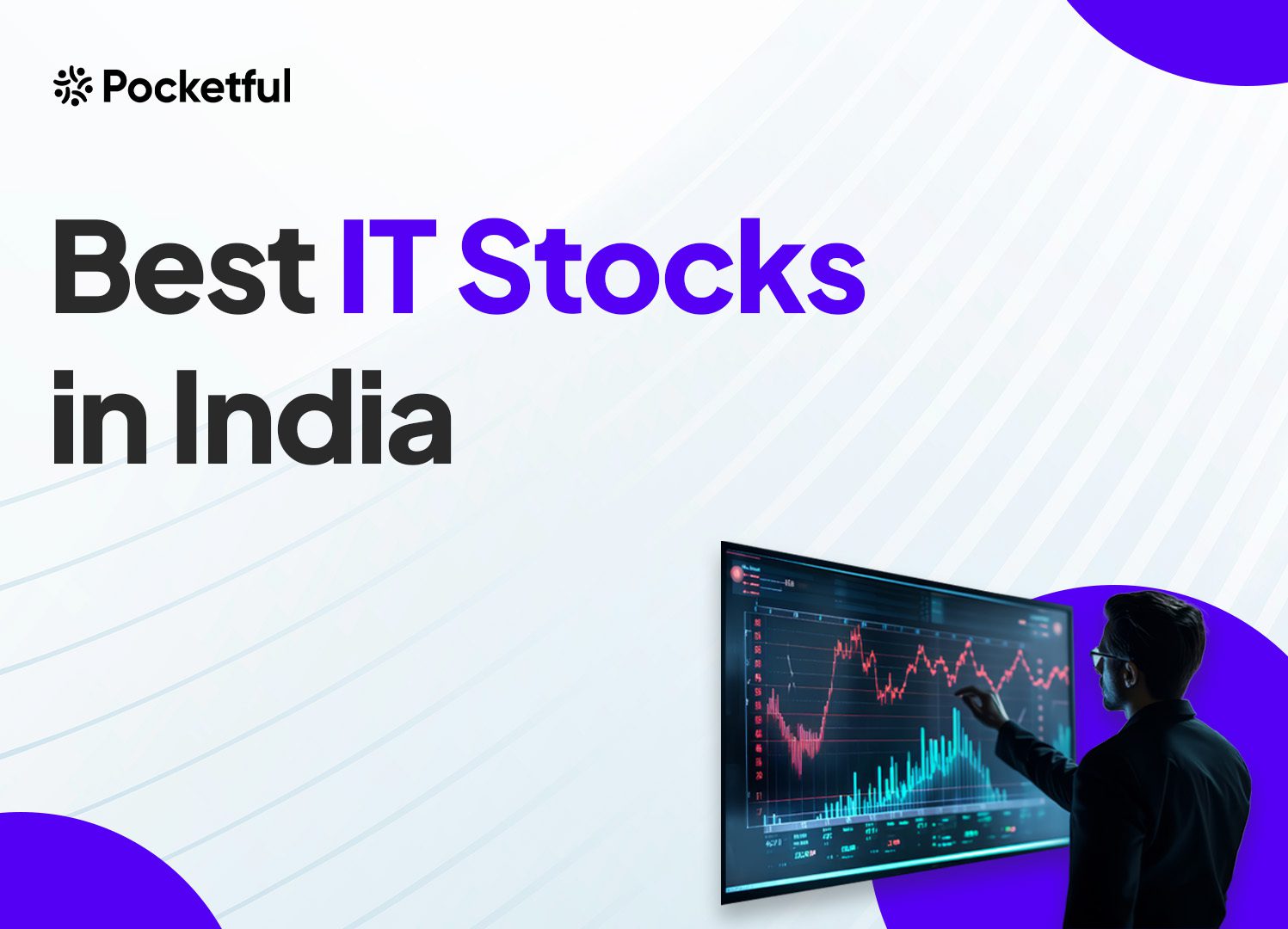| Type | Description | Contributor | Date |
|---|---|---|---|
| Post created | Pocketful Team | Aug-01-24 | |
| Add share price | Nisha | Feb-15-25 | |
| Add share price | Nisha | Feb-15-25 |

- Blog
- best it stocks in india
List Of Best IT Stocks in India 2025

Do you know what makes it possible for everything to be at your fingertips in today’s society, including ordering groceries or your favorite food from the comfort of your home? New and inventive technology developed by the IT companies is the reason behind all this.
In this blog, we will discuss the Indian IT industry and the top 5 stocks based on market capitalization and one-year performance.
Overview of the IT Industry in India

India grew at a rate of 8.2% in the last quarter of FY 2024, which makes it one of the fastest-growing economies in the world. One of the major reasons behind the expansion of the economy is attributed to the IT industry. Technological advancements and a skilled workforce are making India a major player in the IT sector globally. Companies in this industry offer a wide range of services, such as BPO, system integration, software development and maintenance, and more.
Top IT Stocks Based on Market Capitalization
The Top IT Stocks in 2025 are:
| S.No. | IT Stocks |
|---|---|
| 1 | Tata Consultancy Services Ltd. |
| 2 | Infosys Ltd. |
| 3 | HCL Technologies Ltd. |
| 4 | Wipro Ltd. |
| 5 | LTIMindtree Ltd. |
The IT Stocks have been listed in descending order based on their market capitalization in the table below:
| Company | Market Capitalisation (in INR crore) | Current Market Price (INR) | 52-Week High | 52-Week Low |
|---|---|---|---|---|
| Tata Consultancy Services Ltd. | 15,88,340 | 4,390 | 4,431 | 3,311 |
| Infosys Ltd. | 7,76,512 | 1,870 | 1,903 | 1,348 |
| HCL Technologies Ltd. | 4,44,132 | 1,637 | 1,697 | 1,115 |
| Wipro Ltd. | 2,73,005 | 522 | 580 | 375 |
| LTIMindtree Ltd. | 1,68,843 | 5,701 | 6,443 | 4,514 |
Read Also: List of Best Monopoly Stocks in India
Best IT Stocks in India Based on Market Capitalization – An Overview
A brief overview of the best IT stocks in India is given below:
1. Tata Consultancy Services (TCS)
In 1968, Tata Sons Limited established the business to supply punch card services to Tata Steel, a sibling firm. TCS established India’s first software research and development center in Pune in 1981. The company went public on the Indian Stock Exchange in 2004. The company’s Mumbai headquarters are located there. The corporation offers services in cloud computing, artificial intelligence, etc.
| 1Y Return (%) | 3Y Return (%) | 5Y Return (%) |
|---|---|---|
| -4.68% | 3.93% | 79.11% |
2. Infosys
Mr. N.R. Narayana Murthy established Infosys in 1981. Bengaluru became the nation’s IT hub after the corporation relocated its headquarters there. In 1993, the company decided to go public and got listed on the Indian stock market. Infosys was the first Indian company to debut on the NASDAQ Stock Exchange in 1999. The business serves more than 500 clients, some of which are included in the Fortune 500.
| 1Y Return (%) | 3Y Return (%) | 5Y Return (%) |
|---|---|---|
| 10.70% | 9.26% | 134.90% |
3. HCL Technologies Ltd.
In 1976, Shiv Nadar and a handful of other engineers formed HCL Tech. The company started by making and selling personal computers before expanding its operations into software development in 1986. In 1991, the business established HCL Technologies Ltd. as a distinct legal entity. The firm was listed on the Indian Stock markets in 1999. The company’s main office is in Noida, Uttar Pradesh.
| 1Y Return (%) | 3Y Return (%) | 5Y Return (%) |
|---|---|---|
| 1.98% | 48.35% | 174.68% |
4. Wipro
M.H. Hasham Premji established Western India Vegetable Products Limited in 1945 with the primary goal of producing cooking oil initially. Following the demise of Hasham Premji, his son Azim Premji assumed responsibility for the family business. In 1980, he decided to enter the IT industry and is now one of the leading Indian tech companies that offers services in cloud computing, artificial intelligence, robotics, etc.
| 1Y Return (%) | 3Y Return (%) | 5Y Return (%) |
|---|---|---|
| 19.20% | 12.94% | 153.68% |
5. LTIMindtree
L&T Infotech merged with Mindtree to form LTIMindtree in 2022. In 2016, L&T Infotech, a subsidiary of Larsen and Toubro, was listed on the Indian stock market. On the other hand, ten IT specialists founded Mindtree in 1999. The goal of the merger was to boost efficiency, and it was completed in 2022. The company has a workforce of 81,650 employees, and its headquarters is located in Mumbai.
| 1Y Return (%) | 3Y Return (%) | 5Y Return (%) |
|---|---|---|
| -1.15% | -7.76% | 171.51% |
Read Also: List Of Best PSU Stocks in India
Top IT Stocks Based on 1-Year Return
The Top IT Stocks based on 1-year returns are:
| S.No. | IT Stocks |
|---|---|
| 1 | Persistent Systems Ltd. |
| 2 | HCL Technologies Ltd. |
| 3 | Infosys Ltd. |
| 4 | Coforge |
| 5 | Tech Mahindra |
The IT Stocks have been listed in descending order based on their market capitalization in the table below:
| Company | 1-Year Return |
|---|---|
| Persistent Systems Ltd. | 107.28% |
| HCL Technologies Ltd. | 46.73% |
| Tech Mahindra Ltd. | 39.11% |
| Infosys Ltd. | 37.89% |
| Coforge Ltd. | 35% |
Best IT Stocks in India Based on 1-Year Return – An Overview
The best IT Stocks according to 1-year return are given below, along with a brief overview of the services they provide:
Persistent Systems
The company was founded in 1990 by Dr. Anand Deshpande. Initially, the company was focused on software development. The company offers services in cloud computing, internet of things, big data analytics, etc. Intel Capital bought a 3.5% stake in the company for $1 million in 2000. The business generates over $1.2 billion in sales annually and employs more than 23,000 employees. The company’s headquarters is located in Pune.
| 1Y Return (%) | 3Y Return (%) | 5Y Return (%) |
|---|---|---|
| 28.47% | 179.53% | 1,502.74% |
Tech Mahindra
Tech Mahindra was formed in 1986 as a consequence of a joint venture between two distinct entities, Mahindra and Mahindra, and British Telecom, a British telecom company. In 2006, the company was listed on the stock exchange. It expanded its services and clientele after acquiring a significant stake in Satyam Computer Services, another Indian IT firm that collapsed due to a corporate scandal. The company has formed strategic partnerships with several foreign companies, such as Microsoft and AWS, to offer innovative IT solutions. The company’s headquarters are located in Pune.
| 1Y Return (%) | 3Y Return (%) | 5Y Return (%) |
|---|---|---|
| 27.16% | 18.17% | 98.47% |
Coforge
Rajendra S. Pawar and Vijay K. Thandai created NIIT Technologies Ltd. in 1992. In 1999, the corporation established its operational units in the United States, Europe, and other Asia Pacific areas. The company primarily offers IT solutions for financial services, insurance companies, and banks. In 2020, the business rebranded itself as Coforge Limited. The business is also working on machine learning, AI solutions, etc. Its main office is located in Noida, Uttar Pradesh.
| 1Y Return (%) | 3Y Return (%) | 5Y Return (%) |
|---|---|---|
| 18.26% | 77.53% | 322.07% |
An overview of the remaining companies is mentioned above.
Key Performance Indicators (KPIs)
| Company | ROE (%) | ROCE (%) | Debt to Equity | P/E | P/B |
|---|---|---|---|---|---|
| Tata Consultancy Services Ltd. | 50.73 | 63.51 | 0 | 33.9 | 17.57 |
| Infosys Ltd. | 29.77 | 36.81 | 0 | 29.09 | 8.80 |
| HCL Technologies Ltd. | 23 | 27.92 | 0.03 | 27.05 | 6.51 |
| Wipro Ltd. | 14.81 | 17.86 | 0.19 | 24.36 | 3.66 |
| LTIMindtree Ltd. | 22.89 | 28.73 | 0 | 36.77 | 8.38 |
| Persistent Systems Ltd. | 22.05 | 28.79 | 0.04 | 64.21 | 15.17 |
| Tech Mahindra Ltd. | 8.84 | 11.70 | 0.06 | 60.17 | 5.67 |
| Coforge Ltd. | 22.27 | 25.32 | 0.12 | 54.02 | 11.64 |
The Benefit of Investing in IT Stocks
IT stocks can be a valuable addition to your portfolio due to the reasons mentioned below:
- Futuristic Approach – These businesses are mostly involved in developing cutting-edge technologies like cloud computing and artificial intelligence.
- Diversified Portfolio – IT companies typically offer services to a variety of industries, such as healthcare, finance, and pharmaceuticals, protecting them against any downturns in specific industries.
- Revenue Model – The typical revenue strategy in this sector is subscription-based, giving them a reliable and consistent stream of income.
- Global Exposure – IT companies usually operate globally and have clients in many countries.
Factors to be Considered Before Investing in IT Stocks

There are multiple factors one should consider before investing in IT stocks:
- Innovations – Investors should consider organizations that make significant investments in the research and development of new products and services, as these will be the ones that stay ahead of the competition and continue to innovate in the technology space.
- Financial Performance – Analyzing the company’s financial reports will assist you in making an informed investment decision.
- Clients – Investors should consider companies with a diversified source of revenues so that it doesn’t depend on a few big clients.
- Global Economic Conditions – Due to the global operations, the profitability of the company can be impacted by any global event. Currency exchange rates also impact the IT business.
Future of IT Sector in India
In the Indian economy, the IT sector forms a significant part of the GDP. In 2020, this sector made up about 7.7% of the nation’s GDP; by 2025, this contribution is expected to reach 10%. According to a recent NASSCOM analysis, this industry is predicted to generate $250 billion in sales in FY 2024. As a result, this industry has a bright future in India, and the businesses operating in the IT sector are playing a crucial part in the nation’s digital transformation.
Read Also: List of Best Media and Entertainment Stocks in India
Conclusion
In summary, the Indian IT sector plays a major role in the growth of the country’s gross domestic product. This industry has a lot of growth potential, but it also has considerable risks. Due to the constant evolution of the technology industry, businesses operating in this field must continue to innovate and achieve strong performance. However, it is advised to always consult a financial advisor before investing.
Frequently Asked Questions (FAQs)
Should I invest in IT Stocks?
Investing in stocks from the IT sector can provide significant returns because this industry provides a wide range of services globally. As people become increasingly dependent on technology, the industry will grow.
How can I identify the best IT stock to invest in?
An investor should analyze a company’s financial statements and other factors impacting the performance of the stock.
Name the top 5 IT Stocks in India.
Based on market capitalization, TCS, Infosys, Wipro, HCL Tech, and LTI Mindtree are the top IT stocks in India.
What are the major risks associated with investing in the IT Sector?
The main risks of investing in the IT sector are increased competition, a slowing economy, fluctuations in currency exchange rates, etc.
Can I invest in IT stock for the short term?
Yes, you can think about investing in IT stocks for the short term if your investment strategy is focused on technical analysis. On the other hand, you must conduct a fundamental analysis before making a longer-term investment in IT companies.
Disclaimer
The securities, funds, and strategies discussed in this blog are provided for informational purposes only. They do not represent endorsements or recommendations. Investors should conduct their own research and seek professional advice before making any investment decisions.